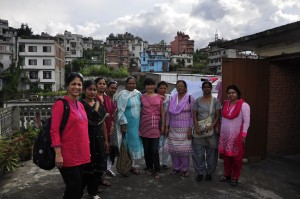Mid-Level Providers: Five Voices From Nepal
Access to safe abortion, does not depend on the law alone. In some countries, where the law already permits abortion, access is restricted because of a small workforce in the hospitals. In recent times, many countries have handled this by permitting their mid-level providers to perform abortions, alongside doctors. One country to seamlessly include such an enabling policy is Nepal.
 As you know, the Asia Safe Abortion Partnership conducted a workshop on task shifting in Nepal in late August. We realized that task shifting is in itself quite a feminist idea: it challenges the traditional hierarchy in the hospitals by allowing nurses to perform tasks previously reserved for doctors. While the high rates of maternal death, made the argument for task shifting easy in Nepal, other countries like India have resisted the idea.
As you know, the Asia Safe Abortion Partnership conducted a workshop on task shifting in Nepal in late August. We realized that task shifting is in itself quite a feminist idea: it challenges the traditional hierarchy in the hospitals by allowing nurses to perform tasks previously reserved for doctors. While the high rates of maternal death, made the argument for task shifting easy in Nepal, other countries like India have resisted the idea.
Bangladesh presents a unique case. Abortion goes by a euphemism in the country: menstrual regulation. But nurses cannot always obtain a license to perform this procedure. When the demand is high, some of them risk their careers to perform the procedures.
We also learned that increasing the headcount alone does not solve the problem. Several cultural and social barriers still persist across South Asia. In countries where abortion is controversial, providers struggle between their moral and professional obligations. Others are targets of their community’s fury.
In this blog we highlight these issues in the voices of the participants themselves.
Mahmooda Khwaja (Pakistan)
“Overall in Pakistan abortion is not culturally accepted. People think it is a sin. Nowadays midwives are trained to provide MVA. But the society questions them, asking why you are doing such illegal things. They want them to be arrested and put in jail.”
Also Read: Abortion and Islam – An Interview with Rashidah Abdullah
Yasmeen Saggu (Pakistan)
“The law does not permit for any abortion until and unless it is medically indicated. But in the society abortions take place for legal and illegal reasons. I believe you have to help the society. But at the same time, god has given us the ability to think logically what is good and bad for us. If a person indulges in immoral activities that is there own act. But as a health care provider, I should give all relevant information and tell them what options are available. What to opt for, and what to do is up to the person who needs care.”
Also Read: Abortion – At the Nexus of Tradition and Modern Views
Saraswathy Kannekanti (India)
“There is no reason midwives should not be allowed to perform abortion. In rural areas, several centers don’t have doctors. So who is there to provide the service? Only nurses, and auxiliary nurse midwives. So, they do the abortions, and they do it well. But it is documented under a doctor’s name. If anything goes wrong, nurses will be blamed. Midwives are not supported by the law.“
Also Read: An Introduction to Task Shifting
Sufia Khatun (Bangaldesh)
“Nurses need a separate certification to do menstrual regulation, and only nurses working in the family welfare sector can do it. But we get a lot of clients in all sectors. So nurses without certificates or training are also performing the service. They do not report it. But if something goes wrong, they get caught.“
Also Read: Addressing Barriers to Safe Abortion.
Ishwari Shrestha (Nepal)
“We are very confident about procedures and about our work. We are able to provide service, do counseling, handle complications like doctors. So tomorrow if Ipas or other donors are not able to support us, and if they have to leave us, we will still continue to do this well. We think this service is our property.“






